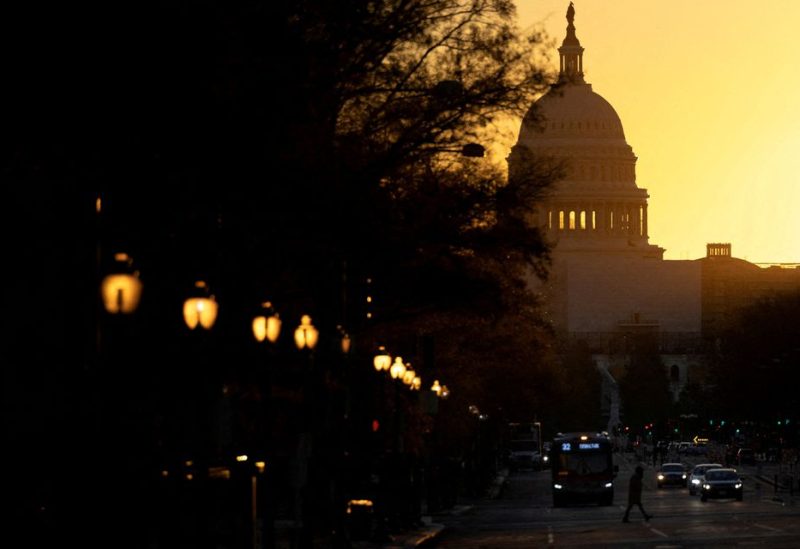
The sun rises over the U.S. Capitol, as control of Congress remained unclear following the 2022 U.S. midterm elections in Washington, U.S., November 9, 2022. REUTERS
After receiving months’ worth of warnings from Democrats and election experts that their ascent could endanger American democracy itself, a group of conspiracy theorists seeking to occupy important U.S. election positions lost races in key battleground states.
The icing on the cake came on Saturday in Nevada, where Republican Jim Marchant, who assisted in organizing candidates under the “America First” banner, was defeated by Democrat Cisco Aguilar in his campaign to become the state’s top election official, according to projections from Edison Research.
Marchant and like-minded candidates echoed former President Donald Trump’s false claims that the 2020 election was rigged and promised to overhaul the voting apparatus in pivotal states such as Michigan, Pennsylvania and Arizona with an eye toward 2024, when Trump is expected to seek the White House once again.
Their defeats were a sign of voters rejecting anti-democratic tendencies in tight midterm elections. President Joe Biden’s Democrats also held their majority in the Senate, Edison Research projected on Saturday, while officials continue to count ballots in 20 races that will determine control of the House of Representatives.
But the “red wave” that Republicans had expected to give them wide congressional majorities and position them to sway the outcome of the 2024 White House race, did not materialize.
In an interview, Aguilar said his victory proved Americans were fed up with election denialism, two years after Trump’s defeat.
“I think it also showed that voters are tired of chaos, and chaos doesn’t work,” Aguilar said. Marchant did not respond to requests for comment.
In swing states Arizona, Nevada and Michigan, “America First” candidates were nominated for secretary of state, the position that oversees elections. Their rise drew an unusual level of attention and spending to the races, which have historically been political afterthoughts compared with the pitched battles for Congress and governorships.
All of those candidates lost. None have publicly conceded defeat.
Democratic Senate Majority Leader Chuck Schumer said his party won because voters were alarmed by the election denial and violent political rhetoric of some Republicans. “We were on the edge of autocracy and thank God the American people pulled us back,” Schumer said at a press conference on Sunday.
In Pennsylvania, where the governor appoints the secretary of state, the Republican gubernatorial candidate was Doug Mastriano, who helped bus supporters to Washington for the Jan. 6, 2021, protests that turned into an attack on the Capitol and said he would not have certified the 2020 results. He lost decisively to Josh Shapiro, the Democratic attorney general.
The only “American First” candidate to win a secretary of state race on Tuesday was Diego Morales in solidly Republican Indiana.
Election deniers consistently ran behind other Republican statewide candidates, according to New York University’s Brennan Center for Justice.
“That says to me that Americans understood the stakes and are firmly on the side of free and fair elections,” said Lawrence Norden, the senior director of Brennan’s elections and government program.
Fears about political violence – stoked by a spike in threats against election workers and armed observers at ballot drop boxes – have also proven unfounded, at least thus far.
Nevertheless, many Republican election deniers won other races around the country.
The Republican base has been infected by Trump’s lies regarding the 2020 election, leading many candidates to either refuse to refute them or to openly embrace them. According to a Reuters/Ipsos poll, almost two-thirds of Republican voters think Trump was the victim of electoral fraud.
A Washington Post analysis of Republican candidates for the House, Senate, and important statewide seats revealed that more than half have expressed doubts about the results of the 2020 election.
On Tuesday, several of those candidates were successful, especially in places with stronger Republican majorities. As of Sunday morning, The Post had monitored more than 170 election deniers who had won their elections, with all but six of them taking place in races that had not been considered competitive prior to Election Day.
In Arizona, Republican Kari Lake and Democratic Secretary of State Katie Hobbs are locked in a contest for governor that hasn’t yet been called. Lake has previously asserted without evidence that the sluggish vote-counting there is the result of fraud.
This past November, Biden frequently reminded people during campaign rallies that “democracy was on the ballot.”
The opposition party had reached a turning point, he told reporters while traveling to Cambodia: “I think the Republican Party is going to have to choose, like our parties in the past have done, it’s going to have to define who they are.”